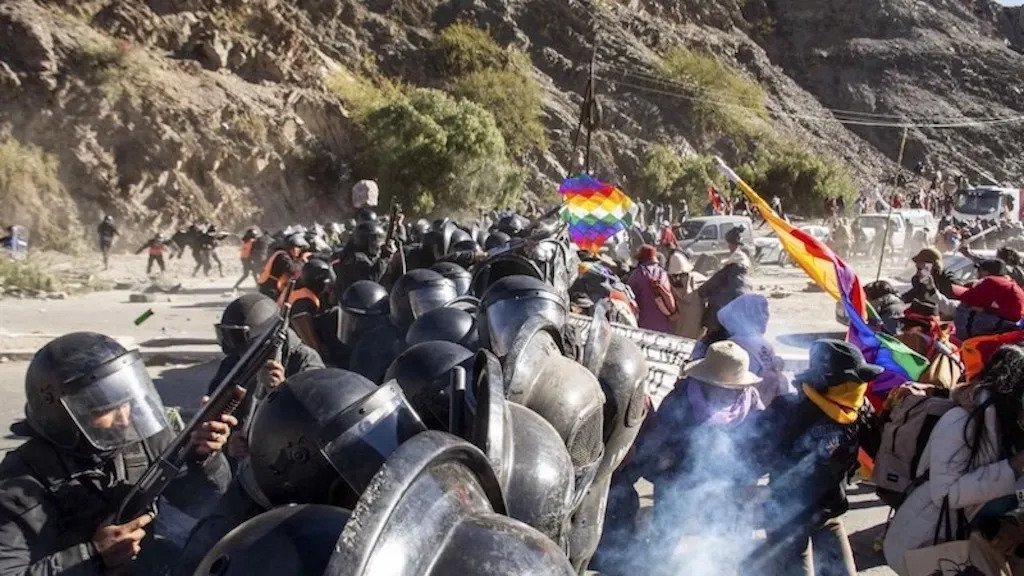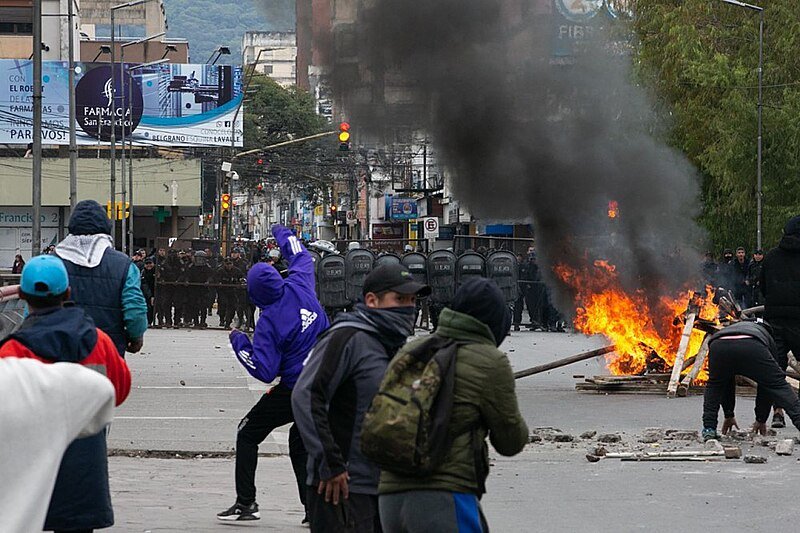
Argentina is witnessing a surge in class struggle, especially in the provinces of Salta and Jujuy, where workers, particularly teachers and healthcare professionals, have taken to the streets in defiance of austerity measures, repression, and controversial constitutional reforms. These events underscore the intensifying conflict between the government’s neoliberal policies and the rights of the working class, whose voices are growing louder in the face of economic hardships exacerbated by inflation and austerity.
The ongoing protests in Jujuy have reached unprecedented levels, evolving into a near insurrection, or “pueblada,” due to the state’s attempts to push through a constitutional reform that benefits mining and real estate interests at the expense of indigenous communities and workers. The reform, led by Governor Gerardo Morales, seeks to curtail workers’ rights, restrict protests, and facilitate the exploitation of lithium reserves on indigenous lands. The violent repression of protesters, including indigenous peoples, has further fueled anger and resistance across the province.
The situation in Jujuy reflects broader dynamics within Argentina, where workers are increasingly organizing in response to the austerity measures imposed by the national and provincial governments. These policies, designed to meet commitments made to the International Monetary Fund (IMF), have severely impacted wages and living conditions. The discontent is palpable, and the potential for a nationwide uprising—reminiscent of Argentina’s 2001 crisis—appears to be growing.
In Salta, the mobilization of teachers and healthcare workers against wage cuts and austerity policies began in late May 2023. These workers, bypassing their union leadership, organized roadblocks and strikes, demanding wage increases that keep pace with inflation. Despite facing repression, including arrests and anti-picket laws, the workers’ struggle culminated in a wage increase of 69%—a partial victory but still below their demands. The persistence of these protests highlights the fighting spirit of Argentina’s working class, which has yet to fully unleash its potential in the streets.
The movement in Jujuy took inspiration from Salta’s mobilizations, with workers and indigenous communities intensifying their resistance against Governor Morales’s constitutional reform. The reform, which was passed under a veil of secrecy on June 16, aims to deepen the exploitation of lithium resources in indigenous territories while simultaneously stripping workers of their rights to protest. Morales, a key political figure with close ties to both the right-wing opposition and segments of the ruling Frente de Todos coalition, has become the face of the repression, using police violence to crush the protests.
Despite the violent crackdowns, which have resulted in dozens of injuries and arrests, the people of Jujuy remain defiant. Roadblocks continue to paralyze key areas of the province, and solidarity protests have erupted across the region. In Purmamarca, indigenous communities and workers have reoccupied roads after being forcibly dispersed by the police. Meanwhile, protests have spread to other cities, including San Salvador de Jujuy, Palpalá, and Humahuaca, signaling the potential for a wider national movement.
The mainstream media’s silence on the events in Jujuy reflects a broader strategy to contain the protests and prevent them from spreading nationwide. However, leftist and workers’ organizations have mobilized to break through this media blockade, calling for national solidarity with the people of Jujuy and demanding the release of all detainees. The Argentine left sees this struggle as part of a broader fight against neoliberalism and repression, emphasizing the need for a united workers’ movement to challenge the policies of the provincial and national governments.
The stakes in Jujuy are high. The constitutional reform represents a direct attack on workers’ rights and indigenous sovereignty, setting a dangerous precedent for other provinces. For the Argentine working class, this moment is a test of its ability to organize and resist in the face of increasing repression. The potential for a general strike looms large, as unions, including the Confederation of Education Workers of Argentina (CTERA), have called for national strikes in solidarity with the Jujuy workers. However, the leadership of the General Confederation of Labor (CGT) remains divided, with some factions hesitant to fully support a general strike, reflecting internal struggles within the labor movement.

The broader economic context in Argentina exacerbates these tensions. The country is grappling with soaring inflation, cuts in public spending, and debt obligations to the IMF, all of which have contributed to growing inequality and poverty. For many workers, the fight in Jujuy is not just about local issues but about the future of the entire country. If the reforms are allowed to stand, it could signal the beginning of a broader crackdown on labor rights and a deepening of neoliberal policies across Argentina.
In conclusion, the events of June 2023 in Argentina, particularly the insurrectionary protests in Jujuy and the mobilizations in Salta, highlight the escalating class struggle in the country. As the government attempts to push through austerity measures and constitutional reforms that benefit corporate interests at the expense of the working class and indigenous peoples, the resistance is growing. The outcome of these struggles will have far-reaching implications for the future of labor rights, indigenous sovereignty, and the balance of power between the government and the people. The call for a general strike and the increasing solidarity among workers across Argentina suggest that the country may be on the cusp of a new wave of social mobilization, one that could reshape the political landscape for years to come.

